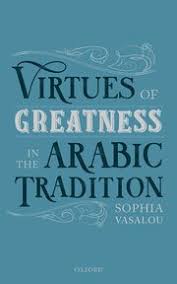Anna Ayse Akosay at Notre Dame Philosophical Reviews:
 What does it mean to be great? Whom shall we call great? How can we become great? Is greatness the same as goodness? These questions involve fundamental ethical assumptions, concepts and concerns. Like many who addressed such issues in the past, we often use virtues — courage, generosity, forbearance, etc. — in order to explain what greatness means, reflecting a common notion that greatness requires moral integrity. Virtues describe our ambitions and aspirations, as individuals and as communities. How we give credit for moral achievements is presumably also culturally conditioned, just as the way we relate to our accomplishments in general reflects social and historical context. Studies on the Dunning-Kruger effect suggest that while North Americans regularly overestimate their abilities, in Japan the opposite appears to be the case. Other variables too are sometimes debated. The self-citation rate among male scientists is often reported to be higher than among their female peers, which might reflect a higher estimation of their achievements. Differences are also believed to be generational and related to educational practices around appreciation and rewards. Recent public debates have shed light on the psychological and emotional costs of self-optimizing and the social and political dynamics of virtue-signaling. Likewise, who our role models should be and how they are selected often reveals the diverging views of greatness in a society. Even a brief survey of these and similar discussions suggests that the philosophical problem of greatness can be of significant interest to contemporary readers.
What does it mean to be great? Whom shall we call great? How can we become great? Is greatness the same as goodness? These questions involve fundamental ethical assumptions, concepts and concerns. Like many who addressed such issues in the past, we often use virtues — courage, generosity, forbearance, etc. — in order to explain what greatness means, reflecting a common notion that greatness requires moral integrity. Virtues describe our ambitions and aspirations, as individuals and as communities. How we give credit for moral achievements is presumably also culturally conditioned, just as the way we relate to our accomplishments in general reflects social and historical context. Studies on the Dunning-Kruger effect suggest that while North Americans regularly overestimate their abilities, in Japan the opposite appears to be the case. Other variables too are sometimes debated. The self-citation rate among male scientists is often reported to be higher than among their female peers, which might reflect a higher estimation of their achievements. Differences are also believed to be generational and related to educational practices around appreciation and rewards. Recent public debates have shed light on the psychological and emotional costs of self-optimizing and the social and political dynamics of virtue-signaling. Likewise, who our role models should be and how they are selected often reveals the diverging views of greatness in a society. Even a brief survey of these and similar discussions suggests that the philosophical problem of greatness can be of significant interest to contemporary readers.
more here.
